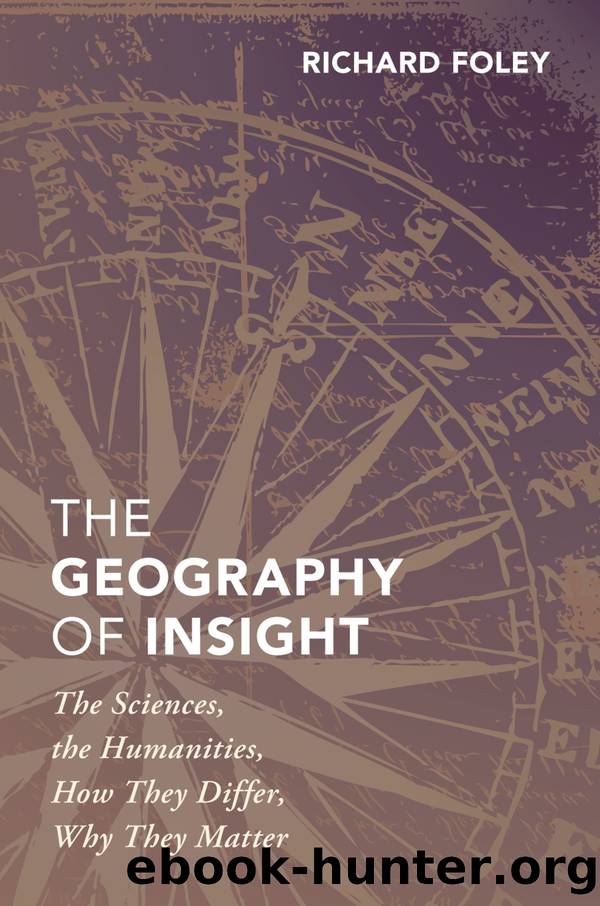The Geography of Insight by Foley Richard;

Author:Foley, Richard;
Language: eng
Format: epub
Publisher: Oxford University Press, Incorporated
Published: 2018-01-15T00:00:00+00:00
INTELLECTUAL AUTHORITY
Great works in the sciences become dated more quickly than those in the humanities. Kepler and Descartes were close contemporaries. Kepler was born in 1571 and died in 1630, while Descartesâs dates were 1596 to 1650. Both made enormous contributions, Kepler to astronomy and Descartes to several fields but especially philosophy. Yet Keplerâs most famous work, New Astronomy, is rarely a part of the training of current students in astronomy, while philosophy students are still expected to have a working familiarity with Descartesâs Meditations on First Philosophy.
Why the difference? Because the kinds of progress to be made in the two fields are different. In philosophy generally, there cannot be progress on its issues in the direction of definitive accounts on which there is a general consensus, whereas in astronomy, there can be and has been such progress. Keplerâs works are thus too dated to be of direct use to contemporary astronomers.
To be sure, Descartes also defended positions that are now regarded as dated. His view of the pineal gland as the location where the mind interacts with the body is a prime example, but his philosophical positions and the arguments he used to defend them still attract attention. This is not because contemporary philosophers are inclined to endorse them, however. What does account for the interest, then?
Intellectual systems, whether in the humanities, sciences, or any other domain, that are majestically ambitious can be enlightening, even when they are deeply flawed. They can be of interest for their overall argumentative strategies, as well as for particular points they make along the way; but they can also be instructive in the ways they fail. Descartesâs system is of interest for all three reasons, but perhaps especially the last. It is often the analysis of where and how his system goes wrong that contemporary philosophers find most relevant in developing their own accounts. I give an illustration of this in the bookâs conclusion, âA Plea for Intellectual Humility,â but for now the main point is that because it is not feasible to settle philosophyâs core problems once and for all, the current significance of its classical works has to be measured differently from developments in the sciences. Contributions in philosophy are not to be evaluated in terms of whether they have been helpful in moving the field toward a consensus but, instead, assessed in terms of whether they can be of help in thinking about the issues with greater clarity, detail, breadth, and coherence. Close attention to the works of classical thinkers can be valuable in this way even when few if any contemporary thinkers agree with those views. I once gave a lecture to undergraduate philosophy students titled, âWhy Descartes Is One of the Greatest Philosophers Who Ever Lived Despite Being Wrong About Almost Everything.â The title was a gimmick, but behind it was this very point.
Classical texts in the sciences, by contrast, do not have as much relevance for current inquiries. At least not directly. They can be thought of
Download
This site does not store any files on its server. We only index and link to content provided by other sites. Please contact the content providers to delete copyright contents if any and email us, we'll remove relevant links or contents immediately.
The remains of the day by Kazuo Ishiguro(8350)
Tools of Titans by Timothy Ferriss(7758)
Giovanni's Room by James Baldwin(6770)
The Black Swan by Nassim Nicholas Taleb(6732)
Inner Engineering: A Yogi's Guide to Joy by Sadhguru(6418)
The Way of Zen by Alan W. Watts(6264)
Asking the Right Questions: A Guide to Critical Thinking by M. Neil Browne & Stuart M. Keeley(5328)
The Power of Now: A Guide to Spiritual Enlightenment by Eckhart Tolle(5307)
The Six Wives Of Henry VIII (WOMEN IN HISTORY) by Fraser Antonia(5206)
Astrophysics for People in a Hurry by Neil DeGrasse Tyson(4981)
12 Rules for Life by Jordan B. Peterson(4151)
Housekeeping by Marilynne Robinson(4036)
The Ethical Slut by Janet W. Hardy(4018)
Skin in the Game by Nassim Nicholas Taleb(3951)
Double Down (Diary of a Wimpy Kid Book 11) by Jeff Kinney(3889)
Ikigai by Héctor García & Francesc Miralles(3846)
The Art of Happiness by The Dalai Lama(3828)
Skin in the Game: Hidden Asymmetries in Daily Life by Nassim Nicholas Taleb(3707)
Walking by Henry David Thoreau(3667)
